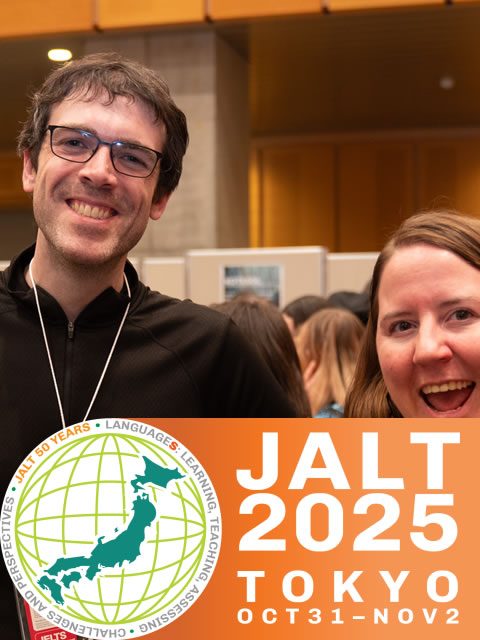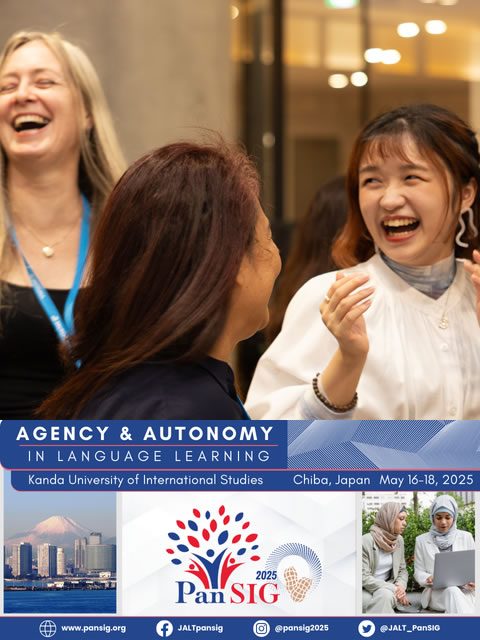Your cart is currently empty!
JALT2008 Technology in Teaching Workshops
•
Friday 31st October 2008 13:00 to 17:00
National Olympics Memorial Youth Center Tokyo, Japan
This year, the JALT Pre-Conference Workshops (formerly the ‘Skills Up’ Workshops) will be entitled the ‘Technology in Teaching’ (TnT) Workshops. Participants at these workshops will be able to develop the technology side of their teaching skills through a series of practical, hands-on workshops. The workshops will be lead by experts in the field of language teaching and technology, with a particular focus on motivating uses of newer technologies. There will also be workshops aimed at developing expertise with more conventional technology.
Features of this year’s workshops:
a diverse selection of workshops, covering such areas as iPods, blogs and wikis, Web 2.0 tools for language learning and course management systems (Moodle)
guidelines outlining technical difficulty of each workshop (‘no previous knowledge required’, ‘some previous knowledge required’, etc.)
a choice of any workshop you wish to attend
a ‘mixed bag’ session, with a series of short workshops on ideas for the classroom
hands-on practice for participants who bring their own laptop computer
Cost for Workshop Participants
JALT Members: 3,000 yen
JALT Non-Members: 4,000 yen
* The fee includes an entire afternoon of workshops!
Room
13:00-14:15
14:15-14:25
14:25-15:40
15:40-15:50
15:50-17:05
102
Mixed Bag #1:
Charlie Robertson, Eric Berg, Michael Sharpe
Break
Video Slideshow:
Sergio Mazzarelli
Break
Mixed Bag #2:
Don Hinkelman, Mark Shrosbree, Forrest Nelson
103
Weaving the Web with CMS:
Paul Collett
Break
Moodle for Beginners:
Paul Daniels
Break
101 Techniques to make your Moodle experience more efficient and effective:
Peter Ruthven-Stuart
107
iPods in the classroom 1: Practical Considerations:
Bill Pellowe
Break
iPods in the classroom 2: Activities:
Mark Neufeld
Break
Introduction to SPSS:
Ian Isemonger
108
TnT reception desk
Titles & Abstracts
Introduction to SPSS
Ian Isemonger, Kochi Women’s University
This workshop is for people who have not used SPSS before (or who have very little experience with it) and who want to know how to get started. I will deal with issues of inputting or importing data and connecting to databases (I will not deal with database development in this workshop). I will then deal with issues of data management – things like dealing with missing values and recoding data. Following this I will talk about getting “a feel” for one’s data. This will include, most importantly, issues of distribution – skewed data, data spread, the role of extreme values and outliers etc. as well as looking at the more general aspects of descriptive statistics such as means etc. I will then point out some of the more basic options available for inferential statistics (there may not be a lot of time for this), and then take questions.
Ian Isemonger is an Associate Professor at Kochi Women’s University. He is the Editor of JALT Journal, a member of the Editorial Board of the Open Applied Linguistics Journal, and is a reader/reviewer for Language Learning Journal and the Journal of Psychoeducational Assessment.
He has published in journals such as Studies in Second Language Acquisition, The Journal of Psychoeducational Assessment, Educational and Psychological Measurement, System and RELC Journal.
Weaving the Web with CMS – Using Content Management Systems for Education or Administration
Paul Collett, Shimonoseki City University
Recent developments in web technology have contributed to steady increases in the functionality of web-based content management systems (CMS), along with a corresponding rise in their popularity. Consequently, there has been substantial growth in the utility of these applications as the growing user base applies them to a wider range of situations, focusing particularly on creating and linking communities. This makes CMSs especially attractive for the creation of interactive online sites for teaching, or for professional organizations.
In this workshop, we will look at setting up a CMS-based web site, starting with the basics of installation and setup of the software and database. We will then look at user management; consider the kinds of functionality that can be added to the site; and work on using the various CMS features to effectively deliver content. It is hoped participants will have the necessary skills by the end of the session to start building their own online community.
For the last ten years Paul Collett has been the online administrator for JALT National, looking after the organization’s internet server, and running both the national and conference web sites, which he recently switched to a CMS. He also runs a number of other sites powered by Content Management Systems, ranging from the Kitakyushu JALT chapter’s homepage through to online shopping sites, as well as learning resources for his students at Shimonoseki City University.
Two-part workshop on using iPods in the classroom
Part 1: Bill Pellowe, Kinki University, Iizuka branch
Part 2: Mark Neufeld, Sakura no Seibo Junior College
Apple’s iPod music and video player can be used to present audio, video, photos and slides, and the Internet provides access to a wide range of free or low-cost materials that can be used for teaching with an iPod. In this presentation, Bill Pellowe will show you the practical steps you need to take in order to make full use of your iPod. This includes:
the basics: How to connect to a TV or video camera
creating slide shows (like PowerPoint presentations)
putting YouTube videos on your iPod
putting DVDs (with or without subtitles) on your iPod
putting textbook CDs onto your iPod
various iPod settings for different types of activities
fail-safe trouble-shooting techniques.
Following this workshop, Mark Neufeld will demonstrate a number of iPod-based activities that make use of
popular music
podcasts
movie trailers
YouTube videos
vocabulary flash cards
photos
slide shows and more
By attending both workshops, you will come away with a good knowledge of what to do and how to get it done.
Bill Pellowe runs ELT Calendar (www.eltcalendar.com), an events website for teachers in Japan. He teaches at the Iizuka branch of Kinki University in Fukuoka Prefecture.
Mark Neufeld has an M.A. in Education from the University of Colorado. He is an assistant professor at Sakura no Seibo Junior College in Fukushima, where he has taught English for 15 years.
Moodle for Beginners
Paul Daniels, Kochi University of Technology
This workshop is a basic Moodle course management system workshop intended for participants who have never used Moodle before. The presenter will first discuss what Moodle is and how it can be used to support language instruction. Several options for Moodle access will also be discussed. Participants who bring along a wireless ready notebook computer will be able to create a course and add content to that course. Basic Moodle activities such as uploading files or adding discussion forums, blogs, wikis and writing journals will be demonstrated.
Paul Daniels teaches English at Kochi University of Technology where he developed a unique project-based science English curriculum accessible to students through Moodle. He has designed over 20 modules to help support language learning in a Moodle environment. His open source Moodle modules can be downloaded from: http://moodlemodules.netcourse.org/.
101 Techniques to make your Moodle experience more efficient and effective
Peter Ruthven-Stuart – Future University-Hakodate
Moodle is fast becoming one of the most popular Learning Management Systems for people to create interactive online courses. However, from a teacher’s point of view the Moodle interface is not very intuitive. As a result, many Moodling teachers are not aware of the many techniques that can make both the process of course creation and the resulting product more efficient and effective. These techniques, sometimes refereed to as workarounds, tricks or shortcuts, consist of little things such as the “Activity Names Auto-linking” filter, and more complex features such the “GIFT” file format for mass producing and importing questions. Other techniques to be explained include the adding of multimedia to Moodle, administrative tasks such as grading, the use of third party software, and the manipulation of links to make courses easier to navigate. The presenter will also welcome any requests the audience may have about how to use Moodle.
Peter Ruthven-Stuart has been blending technology into his teaching since 1997 when he created an interactive web site for his students. He has been using Moodle since 2003, and now administers two Moodle web sites. He has also designed a new Moodle feature called the Question Creation module.
How to Get Your Students to Produce Video without a Video Camera
Sergio Mazzarelli – Kwassui Women’s College
Video production, especially when the final product is shared with a real audience, is a powerful motivator for language learners. However, many teachers hesitate to employ it because of concerns over costs and technological difficulties. In fact, there is a kind of video that can be produced with minimal resources: narrated video slideshows. The presenter will explain how he successfully used video slideshow production in his EFL classes and demonstrate how to create a slideshow with a camera phone, a computer, and a microphone. Participants are welcome to bring their laptops to experiment with slideshow editing. (We will use Windows Movie Maker, which is part of the XP and Vista operating systems, and iMovie, which comes free with all new Macs.)
Dr. Sergio Mazzarelli teaches English at Kwassui Women’s College. He has been using video slideshow production in his classes for a year and has conducted two international exchanges based on student-produced videos.
Mixed bag #2
Building a Digital Repository with Moodle
Don Hinkelman – Sapporo Gakuin University
Is it difficult for teachers to share materials and online activities at your school? Would you like to give your students more and more multi-media activities on Moodle-audio, video, and images? The Project Format for Moodle allows any school to package sections of courses (what you may now be calling “units” or “topics” or “projects”). These packages can be moved around easily and the media files will move around with them. So a teacher does not have to worry about changing links or fiddling with permissions. Many teachers love to share their work and this can lead to accelerated lesson improvement. At Sapporo Gakuin University, we have used the Project Format for nine months and we will share our experience along with tips to make it go smoothly. In addition, I will outline plans for a public repository where teachers all over the world can share Moodle projects.
Don Hinkelman teaches English and intercultural communication at Sapporo Gakuin University in Hokkaido. He is a coordinator of Moodle for Language Teaching, an online community. The team at SGU has developed over ten modules for Moodle-the free, open source learning management system.
Integrating Online and Classroom Activities
Mark Shrosbree – Tokai University
The Internet offers numerous online learning opportunities, but for language learning genuine face-to-face communication is preferred by many teachers. This short workshop will look at methodologies which combine stimulating online activities and content with more conventional in-class activities. Suitable websites, technical considerations and tailor-made handouts will be presented to workshop participants.
Mark Shrosbree has worked at Tokai University Shonan Campus for the last eight years, teaching both general skills and content-based courses. He is particularly interested in materials development and ways that technology can supplement traditional teaching methodologies and motivate learners. He maintains a website to help his students with their study, and to share his teaching materials with other teachers.
Streaming video
Forrest Nelson – Tokai University
This mini workshop will instruct participants in converting video into streaming video for web deployment, linking video quickly to Moodle without allowing public access outside the classroom. These techniques will include both Mac and Windows platforms.
Forrest Nelson came to Japan in 1989 as a professional musician for 4 months. He then returned to the U.S. to finish his degree in Cultural Anthropology and came back to Japan in 1992 to teach. At present, Forrest is teaching at Tokai University Japan. For the past 3 years, he has been interested in using video to help students self assess their presentations and is currently working with a Monbusho sponsored research group regarding the teaching of pragmatics.
Mixed bag #2
Moodle-based MoBlog Project
Charlie Robertson – Tokai University
As a discourse genre and community, EFL students feel very “at home” with blogs. Recently, mobile blogs (or MoBlogs) have proven to be very popular with EFL students as they use their personal mobile phones to upload content directly to the Web, posting photo, video and text files to create personal diaries or “lifestyle journals.” This workshop will give participants a hands-on look at a 5-lesson mobile phone blog (MoBlog) project which required students to create a “lifestyle journal”.
Charles Robertson is from Northern California and holds an undergraduate degree in English Education and a master’s degree in Composition Studies (with an emphasis in L2 composition theory and sociolinguistics) from Humboldt State University. He has been an ESL/EFL instructor for 15 years and has taught in universities and colleges in California and Japan. His current research interests are L2 composition theory, project-based learning and content-based teaching.
Using online video in the classroom
Eric Berg – Tokai University
This workshop focuses on the interactive use of Online Video through the video sharing website, YouTube. Streaming online video was established in 2005, and has since grown into a massive opportunity for learning and educating students. Topics covered in this short mini-workshop will include how to set-up students with accounts, how to find suitable viewing material and how to produce and upload your own online video content. Finally, there will be an explanation on the interactive uses/methods for lesson using the YouTube Web site. The main task here is that students respond to the videos they watch by typing in there own opinions/questions through text comments. It is my pleasure to share with you this wonderful and entertaining tool for educating and helping your students grow both culturally and socially.
Eric Berg worked in Japan as a professional entertainer for 15 years prior to becoming an English teacher at Tokai University in 2007. He has also been involved in video production for the past 18 years including national television, and has co-produced a cable TV series surfing show. After producing his first YouTube video just over a year ago, his site has had over 500,000 views collectively, and his YouTube channel (Ericsurf6) has nearly 1,000 subscribers.
Using CMS (Course Management Software) to complement and enhance a traditional text-based syllabus
Michael Sharpe – Kochi University of Technology
Course Management Software such as Moodle is a simple, effective and versatile way to enhance a text-based syllabus, and enrich the learning process in an age when learners are increasingly looking to source information online. This workshop looks at how a Moodle site is being developed in parallel with a new text, and the ways that this can benefit both student and teacher.
Michael Sharpe is an English instructor at Kochi University of Technology and Kochi Women’s University.

JALT2025 International Conference
2025年10月31日(金)〜2025年11月02日(日) 東京都渋谷 国立オリンピック記念青少年総合センター Friday, October 31 – Sunday, November 02, 2025 • National Olympics Youth Memorial Center, Tokyo, Japan

PanSIG Conference
PanSIG 2025 will be held May 16-18 in Chiba. PanSIG is an annual conference organized by JALT’s Special Interest Groups (SIGs).
